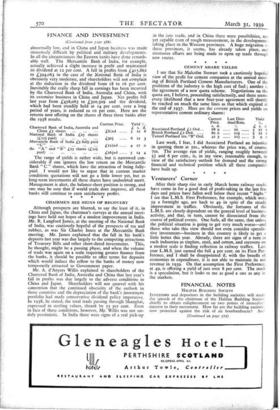CHAIRMEN SEE SIGNS OF RECOVERY Although prospects are blurred, to
say the least of it, in China and Japan, the chairmen's surveys at the annual meet- ings have held out hopes of a modest improvement in India. Mr. R. Langford James, at the meeting of the National Bank of India, was cautiously hopeful of the prospects of tea and rubber, as was Sir Charles Innes at the Mercantile Bank meeting. Mr. James explained that the fall in his bank's deposits last year was due largely to the competing attractions of Treasury Bills and other short-dated investments. This, he thought, might be a passing phase, and when the volume of trade was again on a scale requiring greater finance from the banks, it should be possible to offer terms for deposits which would induce the reflow to the banks of money now temporarily attracted to Government paper.
Mr. A. d'Anyers Willis explained to shareholders of the Chartered Bank of India, Australia and China that last year's fall in profits was due largely to the adverse conditions in China and Japan. Shareholders will not quarrel with his contention that the continued obscurity of the outlook in those countries and the depreciation of the bank's investment portfolio had made conservative dividend policy imperative. In 1938, he stated, the total trade passing through Shanghai, expressed in sterling values, shrank by 55 per cent. Even in face of these conditions, however, Mr. Willis was not un- duly pessimistic. In India there were signs of a real pick-up
in the jute trade, and in China there were possibilities, not yet capable even of rough measurement, in the development; taking place in the Western provinces. A huge migration to these provinces, it seems, has already taken place, and strenuous efforts are being made to open up trade through new routes.


































































 Previous page
Previous page